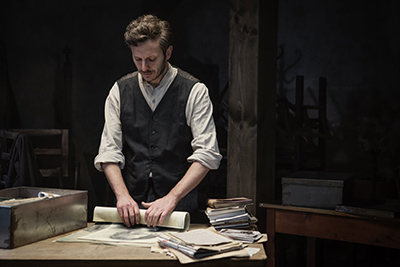Documentary film chronicles a Jewish group’s dangerous mission to collect evidence of Nazi atrocities in Warsaw Ghetto

 “Who Will Write Our History.” Photo by Anna Wloch.
“Who Will Write Our History.” Photo by Anna Wloch.“Who Will Write Our History,” a newly released documentary featuring narration by Joan Allen and Academy Award winner Adrien Brody, chronicles how Ringelblum, a historian who was confined in the ghetto, led a clandestine effort with other inhabitants to amass an archive of journal entries, underground newspapers, eyewitness reports, Nazi decrees and other items that would eventually shine a light on the atrocities that occurred there.
USC Shoah Foundation is a screening partner for the film, which also delves into the life of Rachel Auerbach, a writer who joined Ringelblum’s covert group of journalists, scholars and historians that went by the code name “Oyneg Shabes” -- Yiddish for “Joy of the Sabbath.”
On Sunday, Jan. 27, coinciding with the International Day Of Commemoration In Memory Of The Victims Of The Holocaust, the film about the creation of what came to be known as the Ringelblum Archive will be shown at 200 theaters around the world.
On that day, USC Shoah Foundation Finci-Viterbi Executive Director Stephen Smith hosted a panel discussion at 11:40 a.m. PST at UNESCO in Paris following a screening of the film. The panel was live-streamed on Facebook.
(See more information on the panel here. The film will also be screened in Los Angeles in February 2019.)
Mixing the writings of the archive with new interviews, rarely seen footage and dramatizations, the film – which was written, produced and directed by Roberta Grossman and executive produced by Nancy Spielberg – tells the harrowing story of how one of the most important caches of eyewitness accounts to survive World War II was compiled, beginning in 1940.
Equally dramatic was the act of preserving the archive from violent destruction.
In early 1943, amid a Nazi killing campaign that shipped some 250,000 Jews from the Warsaw Ghetto to the Treblinka death camp during the runup to the decimation of the ghetto, members of the secret group frantically hid about 60,000 documents in milk cans and metal boxes underground. Their efforts provided future historians with indispensable evidence of Nazi brutality in a ghetto that was reduced to rubble.
Auerbach, one of just three members of the Oyneg Shabes group to survive the war, later initiated the effort to unearth the archive. Parts were found in 1946 and again in 1950, but much of it remains undiscovered. Today, the excavated portions of the archive live at the Jewish Historical Institute in Warsaw.
Several Warswaw Ghetto survivors whose testimonies are housed in USC Shoah Foundation’s Visual History Archive knew Ringelblum well.
Minna Aspler had him as a high school teacher in Warsaw in the 1930s.
“We adored (Ringelblum) because he used to tell us always fantastic jokes,” she said in her 1995 testimony. “We didn’t even know how important he was.”
Dorothy Zoltek, another Warsaw Ghetto survivor, said she knew the entire family – she had had both Ringelblum and his wife, Yehudit, as teachers, and tutored their young son, Uri. In her testimony, taken in 1985, Zoltek added that she took part in the Friday night Shabbats in the Warsaw Ghetto organized by Ringelblum.
“The main important task (of the Shabbats) … was that everybody should write down every day’s experience, and this would be … documents for the future,” she said.
USC Shoah Foundation has been involved with the film and topic in other ways. In April of 2018, USC Shoah Foundation’s Center for Advanced Genocide Research cosponsored a screening of the film, which was based on a book by the same name by historian Samuel Kassow.
Later that same month, the Center for Advanced Genocide Research cosponsored a UCLA lecture about the Ringelblum Archive by Kassow.
Like this article? Get our e-newsletter.
Be the first to learn about new articles and personal stories like the one you've just read.